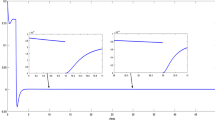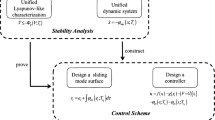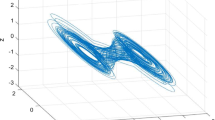Abstract
The multi-weighted coupled neural networks (MWCNNs) models with and without coupling delays are investigated in this paper. Firstly, the finite-time anti-synchronization of MWCNNs with fixed topology and switching topology is analyzed respectively by utilizing Lyapunov functional approach as well as some inequality techniques, and several anti-synchronization criteria are put forward for the considered networks. Furthermore, when the parameter uncertainties appear in MWCNNs, some conditions for ensuring robust finite-time anti-synchronization are obtained. Similarly, we also consider the finite-time anti-synchronization and robust finite-time anti-synchronization for MWCNNs with coupling delays under fixed and switched topologies respectively. Lastly, two numerical examples with simulations are provided to confirm the effectiveness of these derived results.


Similar content being viewed by others
References
Lin SH, Kung SY, Lin LJ (1997) Face recognition/detection by probabilistic decision-based neural network. IEEE Trans Neural Netw 8(1):114–132
Asadia E, Silva MG, Antunes CH, Diasc L, Glicksman L (2014) Multi-objective optimization for building retrofit: a model using genetic algorithm and artificial neural network and an application. Energy Build 81:444–456
Sakthivel R, Vadivel P, Mathiyalaganc K, Arunkumar A, Sivachitra M (2015) Design of state estimator for bidirectional associative memory neural networks with leakage delays. Inf Sci 296:263–274
Zheng ZW, Huang YT, Xie LH, Zhu B (2018) Adaptive trajectory tracking control of a fully actuated surface vessel with asymmetrically constrained input and output. IEEE Trans Control Syst Technol 26(5):1851–1859
Zheng ZW, Sun L, Xie LH (2018) Error constrained LOS path following of a surface vessel with actuator saturation and faults. IEEE Trans Syst Man Cybern Syst 48(10):2168–2216
Gao F, Huang T, Sun JP, Wang J, Hussain A, Yang E (2018) A new algorithm of SAR image target recognition based on improved deep convolutional neural network. Cognit Comput. https://doi.org/10.1007/s12559-018-9563-z
Yue ZY, Gao F, Xiong QX, Wang J, Huang T, Yang E, Zhou HY (2019) A novel semi-supervised convolutional neural network method for synthetic aperture radar image recognition. Cognit Comput. https://doi.org/10.1007/s12559-019-09639-x
Zhang CK, He Y, Jiang L, Wang QG, Wu M (2017) Stability analysis of discrete-time neural networks with time-varying delay via an extended reciprocally convex matrix inequality. IEEE Trans Cybern 47(10):3040–3049
Wang H, Duan S, Huang T, Wang L, Li C (2017) Exponential stability of complex-valued memristive recurrent neural networks. IEEE Trans Neural Netw Learn Syst 28(3):766–771
Wang JL, Wu HN, Guo L (2011) Passivity and stability analysis of reaction-diffusion neural networks with dirichlet boundary conditions. IEEE Trans Neural Netw 22(12):2105–2116
Yang CB, Huang TZ (2014) Improved stability criteria for a class of neural networks with variable delays and impulsive perturbations. Appl Math Comput 243:923–935
Ahn CK (2013) Passive and exponential filter design for fuzzy neural networks. Inf Sci 238:126–137
Wang LM, Zeng ZG, Ge MF, Hu JH (2018) Global stabilization analysis of inertial memristive recurrent neural networks with discrete and distributed delays. Neural Netw 105:65–74
Prakash M, Balasubramaniam P, Lakshmanan S (2016) Synchronization of Markovian jumping inertial neural networks and its applications in image encryption. Neural Netw 83:86–93
Xie QX, Chen GR, Bollt EM (2002) Hybrid chaos synchronization and its application in information processing. Math Comput Model 35:145–163
Zhang J, Gao YB (2017) Synchronization of coupled neural networks with time-varying delay. Neurocomputing 219:154–162
Zhang H, Sheng Y, Zeng ZG (2018) Synchronization of coupled reaction-diffusion neural networks with directed topology via an adaptive approach. IEEE Trans Neural Netw Learn Syst 29(5):1550–1561
Wang JY, Zhang HG, Wang ZS, Shan QH (2016) Local synchronization criteria of markovian nonlinearly coupled neural networks with uncertain and partially unknown transition rates. IEEE Trans Syst Man Cybern 47(8):1953–1964
Bao HB, Park JH, Cao JD (2016) Exponential synchronization of coupled stochastic memristor-based neural networks with time-varying probabilistic delay coupling and impulsive delay. IEEE Trans Neural Netw Learn Syst 27(1):190–201
Chen HB, Shi P, Lim CC (2017) Exponential synchronization for markovian stochastic coupled neural networks of neutral-type via adaptive feedback control. IEEE Trans Neural Netw Learn Syst 28(7):1618–1632
Huang YL, Xu BB, Ren SY (2018) Analysis and pinning control for passivity of coupled reaction–diffusion neural networks with nonlinear coupling. Neurocomputing 272(10):334–342
Huang YL, Wang SX, Ren SY (2019) Pinning exponential synchronization and passivity of coupled delayed reaction–diffusion neural networks with and without parametric uncertainties. Int J Control 92(5):1167–1182
Altafini C (2013) Consensus problems on networks with antagonistic interactions. IEEE Trans Autom Control 58(4):935–946
Kim CM, Rim S, Kye WH, Ryu JW, Park YJ (2003) Anti-synchronization of chaotic oscillators. Phys Lett A 320(1):39–46
Wang WP, Li LX, Peng HP, Wang WN, Kurths J, Xiao JH, Yang YX (2016) Anti-synchronization of coupled memristive neutral-type neural networks with mixed time-varying delays via randomly occurring control. Nonlinear Dyn 83(4):2143–2155
Liu D, Zhu S, Sun K (2018) Global anti-synchronization of complex-valued memristive neural networks with time delays. IEEE Trans Cybern. https://doi.org/10.1109/TCYB.2018.2812708
Zhao HY, Zhang Q (2011) Global impulsive exponential anti-synchronization of delayed chaotic neural networks. Neurocomputing 74:563–567
Sakthivel R, Anbuvithya R, Mathiyalagan K, Ma YK, Prakash P (2016) Reliable anti-synchronization conditions for BAM memristive neural networks with different memductance functions. Appl Math Comput 275:213–228
Wang JY, Zhang HG, Wang ZS, Gao WZ (2017) Finite-time synchronization of coupled hierarchical hybrid neural networks with time-varying delays. IEEE Trans Cybern 47(10):2995–3004
Liu XY, Cao JD, Yu WW, Song Q (2016) Nonsmooth finite-time synchronization of switched coupled neural networks. IEEE Trans Cybern 46(10):2360–2371
Liu XW, Chen TP (2018) Finite-time and fixed-time cluster synchronization with or without pinning control. IEEE Trans Cybern 48(1):240–252
Sun JW, Wang Y, Wang YF, Shen Y (2016) Finite-time synchronization between two complex-variable chaotic systems with unknown parameters via nonsingular terminal sliding mode control. Nonlinear Dyn 85(2):1105–1117
Sun JW, Wu YY, Cui GZ, Wang YF (2017) Finite-time real combination synchronization of three complex-variable chaotic systems with unknown parameters via sliding mode control. Nonlinear Dyn 88(3):1677–1690
Sun JW, Zhao XT, Fang J, Wang YF (2018) Autonomous memristor chaotic systems of infinite chaotic attractors and circuitry realization. Nonlinear Dyn 94(4):2879–2887
Zhang DY, Shen YJ, Mei J (2017) Finite-time synchronization of multi-layer nonlinear coupled complex networks via intermittent feedback control. Neurocomputing 225:129–138
Mei J, Jiang MH, Xu WM, Wang B (2013) Finite-time synchronization control of complex dynamical networks with time delay. Commun Nonlinear Sci Numer Simul 18(9):2462–2478
Wang LM, Shen Y, Zhang GD (2017) Finite-time stabilization and adaptive control of memristor-based delayed neural networks. IEEE Trans Neural Netw Learn Syst 28(11):2648–2659
Wang LM, Zeng ZG, Hu JH, Wang XP (2017) Controller design for global fixed-time synchronization of delayed neural networks with discontinuous activations. Neural Netw 87:122–131
Huang YL, Qiu SH, Ren SY (2019) Finite-time synchronization and passivity of coupled memristive neural networks. Int J Control. https://doi.org/10.1080/00207179.2019.1566640
Zheng ZW, Xie LH (2017) Finite-time path following control for a stratospheric airship with input saturation and error constraint. Int J Control. https://doi.org/10.1080/00207179.2017.1357839
Sui X, Yang YQ, Wang F, Zhang LZ (2017) Finite-time anti-synchronization of time-varying delayed neural networks via feedback control with intermittent adjustment. Adv Differ Equ NY. https://doi.org/10.1186/s13662-017-1264-5
Wang WP, Li LX, Peng HP, Kurths J, Xiao JH, Yang YX (2016) Finite-time anti-synchronization control of memristive neural networks with stochastic perturbations. Neural Process Lett 43(1):49–63
Qiu SH, Huang YL, Ren SY (2018) Finite-time synchronization of multi-weighted complex dynamical networks with and without coupling delay. Neurocomputing 275:1250–1260
Wang JL, Xu M, Wu HN, Huang TW (2018) Finite-time passivity of coupled neural networks with multiple weights. IEEE Trans Netw Sci Eng 5(3):184–197
Huang YL, Ren SY (2018) Passivity and passivity-based synchronization of switched coupled reaction–diffusion neural networks with state and spatial diffusion couplings. Neural Process Lett 47(2):347–363
Wu YY, Cao JD, Li QB, Alsaedi A, Alsaadi FE (2017) Finite-time synchronization of uncertain coupled switched neural networks under asynchronous switching. Neural Netw 85:128–139
Wen GH, Yu WW, Hu GQ, Cao JD, Yu XH (2015) Pinning synchronization of directed networks with switching topologies: a multiple lyapunov functions approach. IEEE Trans Neural Netw Learn Syst 26(12):3239–3250
Zhen Q, Wang JL, Huang YL, Ren SY (2017) Synchronization and \(\cal{H}_\infty \) synchronization of multi-weighted complex delayed dynamical networks with fixed and switching topologies. J Frankl Inst 354:7119–7138
Wang SX, Huang YL, Ren SY (2017) Synchronization and robust synchronization for fractional-order coupled neural networks. IEEE Access 5:12439–12448
Zheng C, Cao JD (2014) Robust synchronization of coupled neural networks with mixed delays and uncertain parameters by intermittent pinning control. Neurocomputing 141:153–159
Qin Z, Wang JL, Huang YL, Ren SY (2018) Analysis and adaptive control for robust synchronization and \(\cal{H}_\infty \) synchronization of complex dynamical networks with multiple time-delays. Neurocomputing 289:241–251
Liang JL, Wang ZD, Liu YR, Liu XH (2008) Robust synchronization of an array of coupled stochastic discrete-time delayed neural networks. IEEE Trans Neural Netw 19(11):1910–1921
Tang Y (1998) Terminal sliding mode control for rigid robots. Automatica 34(1d):51–56
Huang XQ, Lin W, Yang B (2005) Global finite-time stabilization of a class of uncertain nonlinear systems. Automatica 41:881–888
Shen H, Huo SC, Cao JD, Huang TW (2019) Generalized state estimation for Markovian coupled networks under round-robin protocol and redundant channels. IEEE Trans Cybern 49(4):1292–1301
Shen H, Li F, Yan HC, Karimi HR, Lam HK (2019) Finite-time event-triggered \(\cal{H}_\infty \) control for T–S fuzzy Markov jump systems. IEEE Trans Fuzzy Syst 26(5):3122–3135
Shen H, Li F, Xu SY, Sreeram V (2018) Slow state variables feedback stabilization for semi-Markov jump systems with singular perturbations. IEEE Trans Autom Control 63(8):2709–2714
Shen H, Wang T, Cao JD, Lu GP, Song YD, Huang TW (2018) Nonfragile dissipative synchronization for Markovian Memristive neural networks: a gain-scheduled control scheme. IEEE Trans Neural Netw Learn Syst. https://doi.org/10.1109/TNNLS.2018.2874035
Shen H, Men YZ, Wu ZG, Cao JD, Lu GP (2019) Network-based quantized control for fuzzy singularly perturbed semi-Markov jump systems and its application. IEEE Trans Circuits Syst I Regul Pap 66(3):1130–1140
Shen H, Li F, Wu ZG, Park JH, Sreeram V (2018) Fuzzy-model-based non-fragile control for nonlinear singularly perturbed systems with semi-Markov jump parameters. IEEE Trans Fuzzy Syst 26(6):3428–3439
Shen H, Men YZ, Wu ZG, Park JH (2018) Nonfragile \(\cal{H}_\infty \) control for fuzzy Markovian jump systems under fast sampling singular perturbation. IEEE Trans Syst Man Cyber Syst 48(12):2058–2069
Acknowledgements
The authors would like to thank the Associate Editor and anonymous reviewers for their valuable comments and suggestions. They also wish to express their sincere appreciation to Prof. Jinliang Wang for the fruitful discussions and valuable suggestions which helped to improve this paper. This work was supported in part by the Natural Science Foundation of Tianjin city under Grant 18JCQNJC74300, in part by China Scholarship Council (No. 201808120044), and in part by the National Natural Science Foundation of China under Grant 61773285. Dr E. Yang is supported in part under the RSE-NNSFC Joint Project (2017–2019) (6161101383) with China University of Petroleum (East China).
Author information
Authors and Affiliations
Corresponding author
Additional information
Publisher's Note
Springer Nature remains neutral with regard to jurisdictional claims in published maps and institutional affiliations.
Rights and permissions
About this article
Cite this article
Hou, J., Huang, Y. & Yang, E. Finite-Time Anti-synchronization of Multi-weighted Coupled Neural Networks With and Without Coupling Delays. Neural Process Lett 50, 2871–2898 (2019). https://doi.org/10.1007/s11063-019-10069-x
Published:
Issue Date:
DOI: https://doi.org/10.1007/s11063-019-10069-x




